Routers de empresa de la serie AR1200
Los routers de la serie AR1200 de Huawei están diseñados para proporcionar comunicaciones de voz y datos unificadas, seguras y escalables para empresas pequeñas o grandes sucursales.
The AR1200 uses the embedded hardware encryption technique and supports the voice Digital Signal Processor (DSP). It supports firewall functions, call processing, voice mail, and various application programs. The AR1200 supports various wired and wireless access modes, such as E1/T1, xDSL, xPON, WiFi, 3G, etc. The AR1220V, AR1220W, AR1220VW provide the PoE function by using fixed 100M Ethernet interfaces.
The AR1200 series include: AR1220, AR1220V, AR1220W, AR1220VW,

AR1220
Forwarding capacity: 450 Kpps
WAN speed with services: 200Mbps
Fixed port: 8*FE, 2*GE
Slot: 2*SIC
Dimensions (WxDxH): 390 mm x 220 mm x 44.5mm
AR1220V
Forwarding capacity: 450 Kpps
WAN speed with services: 200Mbps
Fixed port: 8*FE(four FE ports support PoE), 2*GEPoE: compliance with IEEE 802.3af and 802.3at
DSP: 32 channels supported
Slot: 2*SIC
Dimensions (WxDxH): 390 mm x 220 mm x 44.5mm
AR1220W
Forwarding capacity: 450 Kpps
WAN speed with services: 200Mbps
Fixed port: 8*FE (four FE ports support PoE), 2*GEPoE: compliance with IEEE 802.3af and 802.3at
Slot: 2*SIC
WiFi: compliance with 802.11b/g/n
Dimensions (WxDxH): 390 mm x 220 mm x 44.5mm
AR1220VW
Forwarding capacity: 450 Kpps
WAN speed with services: 200Mbps
Fixed port: 8*FE (four FE ports support PoE), 2*GE
PoE: compliance with IEEE 802.3af and 802.3at
DSP: 32 channels supported
Slot: 2*SIC
WiFi: compliance with 802.11b/g/n
Dimensions (WxDxH): 390 mm x 220 mm x 44.5mmThe AR1200 supports various interface cards, including Ethernet interface cards, E1/T1/PRI/VE1/VT1 interface cards, synchronous/asynchronous interface cards, ADSL2+/G.SHDSL interface cards, FXS/FXO voice cards, ISDN interface cards and EPON/GPON interface cards. These cards are classified into SIC (Smart Interface Card) cards and WSIC (Double-Width SIC) cards depending on slot type.
The following are the appearances and description of main interface cards. 
Channelized E1/T1/PRI/VE1/VT1 multifunctional interface card
SIC card Sends, receives, and processes E1/T1 data traffic.
Provides channelized E1/T1 access, and groups and binds channels.
Provides the VoIP function over the E1/T1 line.
Provides the ISDN PRI function.
Provides the local and remote loopback functions for test and troubleshooting.
FXS/FXO voice card
SIC card Supports access and processing of AT0 loop trunk of analog phone, fax, and telephone exchange.
Transmits voice signals over IP network.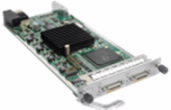
Sync/Async Serial Port Interface Card
SIC card A synchronous serial interface can function as a DCE or DTE. It supports multiple physical layer protocols, such as V.24, V.35, and X.21, but does not support X.21 DCE. The interface provides a maximum transmission rate of 2.048 Mbit/s.
An asynchronous serial interface supports the RS232 protocol and provides a maximum transmission rate of 115.2 kbit/s.
Provides in-service upgrade by using system management channels.
The system powers on or off the 1SA/2SA and monitors the current of the 1SA/2SA; the backplane provides 12 V voltage for the 1SA/2SA.
GE Combo WAN Interface CardSIC card Provides one GE optical and electrical Combo interface to implement data access and line-speed switching.
The Combo interface sends, receives, and processes GE data traffic.
The electrical interface works at 10/100/1000 Mbit/s in auto-sensing mode.
The optical interface works at 100/1000 Mbit/s in auto-sensing mode.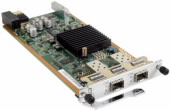
GPON/EPON Dual-Mode Interface Card
SIC card Supports OLT clock synchronization but not the 1588 function.
Supports EPON/GPON but not GE.
Supports the DyingGasp function.
Supports rogue ONT detection and isolation.
Detects the receiving optical power.
Supports delayed reset.-
1 3rd Generation AR with Industry-Leading Performance
- Multi-core CPU
- The multi-core CPU improves the speed of concurrent processing of data and voice services, which makes it possible to deploy a large number of services.
- Non-blocking switching for service traffic
- The bus channel bandwidth of single slot is up to 10 Gbit/s.
- Independent protocol management, service processing, and data switching, ensuring high performance and improving service reliability
- Integrated routing and switching functions
- This feature improves the data switching efficiency between interface cards and simplifies device configurations and maintenance.
- Hot swappable interface cards and redundant components such as fan modules and power modules ensuring service reliability and stability
2 Dual-Mode Network, Supporting Flexible Access
Access Mode Description Wireless Mode WLAN Compliance with 802.11n and compatible with 802.11b/g, saving investment
Multiple-input and multiple-output (MIMO), increasing bandwidth and improving user experience
Authentication technologies such as WEP, WPA/WPA2, WAPI and 802.1x, ensuring security3G Compliance with 3G standards, including CDMA2000 EV-DO, WCDMA, and TD-SCDMA, providing flexible network access
NQA, monitoring the link real-time status and ensuring SLA
Link backup for enterprise services, improving reliability
Security VPN over 3G links, ensuring reliable service transmissionLTE Switching from 3G networks to LTE networks supported in future, protecting customers' investments Wired Mode Fiber Support for GigabitEthernet and CPOS optical interfaces, allowing flexible network access
1 Gbit/s bandwidth or higher bandwidth, meeting transmission requirements of bandwidth-thirsty services such as voice services
Support EPON/GPON interface cardsCopper cable Support for various interfaces, including xDSL interfaces, E1/T1 interfaces, serial ports, and ISDN interfaces, to protect customers' investments
Uplink access rates ranging from 64 kbit/s to 1 Gbit/s, which can be selected by customers
PoE support on Ethernet interfaces, providing power for powered devices over twisted pair cables and facilitating installation of powered devices
3 Services Integrated on One Router
The AR1200 integrates routing, switching, 3G, WLAN, voice, and security functions.
Open Service Platform
The AR1200 interconnects with the third-party IT systems by using the Open Service Platform (OSP) to provide a unified communication solution for enterprise users. The customers, agents, third-party vendors, and manufacturers can develop and use the AR1200 as required.
- Fast service integration and customization, meeting customized requirements
- Service integration without deploying dedicated servers, saving investments and simplifying management
- Services synchronized with cloud-side services, local services processed locally, which improves service quality and efficiency.
Outstanding Voice Experience
The AR1200 provides various voice functions for enterprise data networks, enabling the enterprises to communicate flexibly and efficiently.
- Basic voice functions provided by the built-in PBX, SIP server, and SIP access gateway
- Value-added voice services, including multi-party communication, IVR automatic connection, ring-back-tone, parallel ringing, sequential ringing, one number link you (ONLY), bill management, and subscriber management
- Intelligent call routing, ensuring high reliability of voice services
- Interconnection with the NGN/IMS/PBX/terminal of mainstream vendors
- QoE, detecting voice service quality in real time
- Jitter buffer, echo cancellation, and packet loss compensation, improving customer experiences
Secure Service Access
During service provision, the AR1200 ensures security of enterprise networks. It provides a complete security protection mechanism including user access control, packet detection, and active attack defense. This mechanism protects customers' investments.
- Built-in firewall
- Authentication technologies on ports, such as 802.1x authentication, MAC address authentication, and portal authentication
- Authentication methods, including RADIUS and HWTACACS
- VPN technologies, including IPSec VPN, GRE VPN, DSVPN and SSL VPN
Intelligent Service Deployment
As the enterprise scale increases, enterprise users have high requirements on service deployment. The AR1200 provides the following service deployment functions:
- The AR1200 provides a mini-USB port. By using the mini-USB, users can configure the devices through GUI.
- Users can use the USB disk to deploy devices, and the devices are plug-and-play.
- The AR1200 supports the auto-config function. The auto-config function enables the AR1200 to automatically obtain configurations.
Simplified Service Management
Enterprise users require simply service management. The AR1200 provides the following functions to simplify service management:
- The AR1200 works with the eSight network management system to simplify device management.
- The AR1200 provides the NQA function to monitor links in real time.
- By using the NetStream function provided by the AR1200, users can view traffic characteristics and statistics clearly, which is basis for network optimization.
-
1 WAN Access
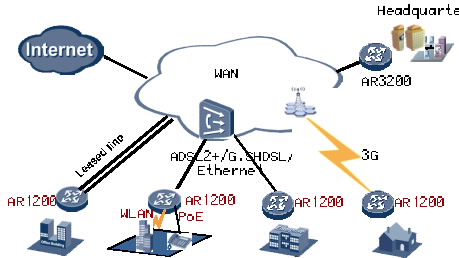
The AR1200 functions as the egress routers of enterprise branches and provide flexible access methods to support remote network connections. AR1200 meets various access requirements, including leased line, Ethernet, xDSL, 3G, and WLAN. This saves deployment and maintenance costs and provides a large value to customers. The fixed 100M Ethernet interfaces of AR1220V, AR1220W and AR1220VW support the PoE function in compliance with IEEE 802.3af and 802.3at; therefore, the AR1220V, AR1220W and AR1220VW can provide power for powered devices (PDs), such as IP phones. An 802.3at interface provides more than 30 W power, ensuring power for large-power PDs.
2 High-Quality Voice Service
As a voice gateway for enterprise networks, the AR1200 can function as an IP PBX or SIP gateway.
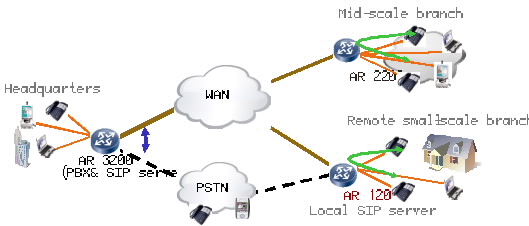
Figure 1. IP PBX application
The AR routers have built-in PBX, which supports the enterprise main number, IVR, and bill query functions to enhance corporate image and improve enterprise communication efficiency. And also the AR1200 can be located in a branch to provide the intelligent dialing function.
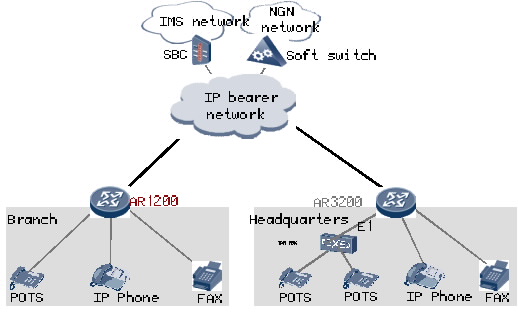
Figure 2. SIP gateway application
The AR1200 integrates voice, fax, and IP services. When providing voice services for enterprise users, the AR1200 functions as the SIP access gateway of a branch to transform phone signals into VoIP signals. The AR1200 uplink interfaces are connected to the IMS/NGN network to allow any media including phones, handsets, and computers to communicate at any time.
3 3G Wireless Access in Branch
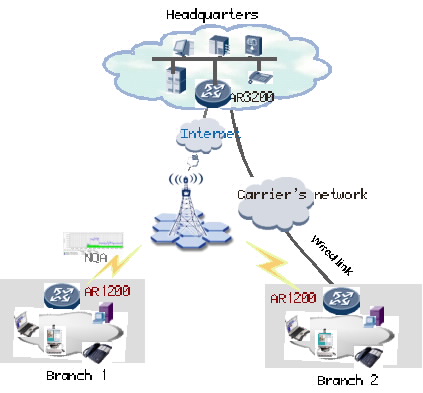
The AR1200 complies with 3G standards including CDMA2000 EV-DO, WCDMA, and TD-SCDMA, meeting the wireless communication requirements between branches and the headquarters. Users can use a 3G USB disk to deploy 3G services on the AR1200, saving service card slots. In addition, the 3G data link can be used as a backup for wired link to protect the xDSL, FE/GE, and ISDN uplinks. The backup link improves network stability and reduces network construction costs. The AR1200 provides the NQA function to detect 3G link quality, ensuring the SLA.
4 VPN in Branch
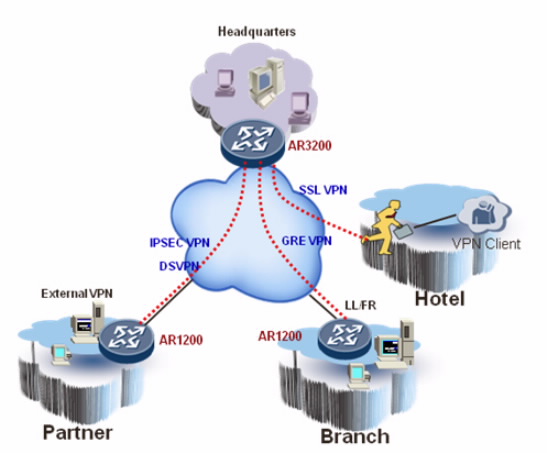
The AR1200 provides various secure access functions to implement communication between enterprise branches and between branches and the headquarters, and to enable partners to access enterprise resources. Tunnels such as GRE VPN, IPSEC VPN, DSVPN and SSL VPN are set up between the headquarters and branches to implement secure data access and transmission. The AR1200 implements fast tunnel deployment and authentication for branches. Using a tunnel, partners can access and share enterprise resources.
-
Item AR1220 AR1220V AR1220W AR1220VW Hardware Forwarding capacity (64 Byte) 450 Kpps 450 Kpps 450 Kpps 450 Kpps WAN speed with services 200 Mbps 200 Mbps 200 Mbps 200 Mbps Device switching capacity 8 Gbps 8 Gbps 8 Gbps 8 Gbps Slot switching bandwidth SIC & WSIC slots 2 Gbps Fixed WAN ports 2 * GE 2 * GE 2 * GE 2 * GE Fixed LAN ports 8 * FE 8 * FE 8 * FE 8 * FE SIC slots 2 2 2 2 WSIC slots 0/1 0/1 0/1 0/1 (default/max) DSP slots - 32 channels supported by default - 32 channels supported by default WiFi - - 802.11 b/g/n 802.11 b/g/n USB 2.0 ports 2 2 2 2 Mini-USB ports 1 1 1 1 Serial auxiliary/ console port 1 1 1 1 Memory 512 MB 512 MB 512 MB 512 MB Flash 256 MB 256 MB 256 MB 256 MB Max. power 54 W 54 W 54 W 54 W PoE power - External 100 W External 100 W External 100 W AC power 100 V-240 V 100 V-240 V 100 V-240 V 100 V-240 V Frequency 50 Hz/60 Hz 50 Hz/60 Hz 50 Hz/60 Hz 50 Hz/60 Hz Dimensions (width x depth x height) 390 mm x 220 mm x 44.5 mm 390 mm x 220 mm x 44.5 mm 390 mm x 220 mm x 44.5 mm 390 mm x 220 mm x 44.5 mm Weight 2.9 KG (without interface cards) 2.9 KG (without interface cards) 2.9 KG (without interface cards) 2.9 KG (without interface cards) Ambient temperature 0°C-40°C 0°C-40°C 0°C-40°C 0°C-40°C Relative humidity 5-90% (non-condensing) 5-90% (non-condensing) 5-90% (non-condensing) 5-90% (non-condensing) Software Basic feature DHCP server/client, PPPoE server/client, PPPoA client, PPPoEoA client, NAT, Sub interface management Voice RTP, SIP, SIP AG, IP PBX/TDM PBX, FXO/FXS, VoIP/conference call WLAN AP management, WLAN QoS (WMM), WLAN security (WEP/WPA/WPA2/key management), WLAN radio management (802.11b/g/n), WLAN user management 3G CDMA 2000 EV-DO Rev A, WCDMA, TD-SCDMA, individual 3G uplink/backup link LAN IEEE 802.1P, IEEE 802.1Q, IEEE 802.3, VLAN management, MAC address management, MSTP IPv4 unicast routing Routing policy, static route, RIP, OSPF, IS-IS, BGP Multicast IGMP V1/V2/V3, IGMP-Snooping V1/V2/V3, PIM SM, PIM DM, MSDP MPLS LDP, MPLS L3 VPN, static LSP, dynamic LSP VPN IPSec VPN, GRE VPN, DSVPN, SSL VPN, L2TP VPN QoS Diffserv mode, MPLS QoS(except –S model), priority mapping, traffic policing (CAR), traffic shaping, congestion avoidance (based on IP precedence/DSCP WRED), congestion management (LAN interface: SP/WRR/SP+WRR; WAN interface: PQ/CBWFQ), MQC (traffic classifier, traffic behavior, and traffic policy), H-QoS, WLAN QoS, FR QoS Security ACL, firewall, 802.1x authentication, AAA authentication, RADIUS authentication, HWTACACS authentication, broadcast storm suppression, ARP security, ICMP attack defense, URPF, CPCAR, blacklist, IP source tracing Management and maintenance Upgrade management, device management, GTL, SNMP(v1/v2c/v3), NTP, CWMP, Auto-Config, deployment using USB disk, NetConf, CLI **Note: The maximum number of slots includes the number of combined slots.
Before choosing an AR1200, determine the device model, interface cards, and software configurations.
Device model and main control board
- The device model is determined by the slot quantity and forwarding capacity that you require.
Service card
- The interface cards, including SIC cards and WSIC cards, are inserted into service card slots. Two SIC slots can be combined into one WSIC slot by removing the guide rail.
Software
- The basic software and licensed software are available. The basic software provides basic functions such as routing, switching, voice, and security. The licensed software provides additional functions such as PBX.
-

